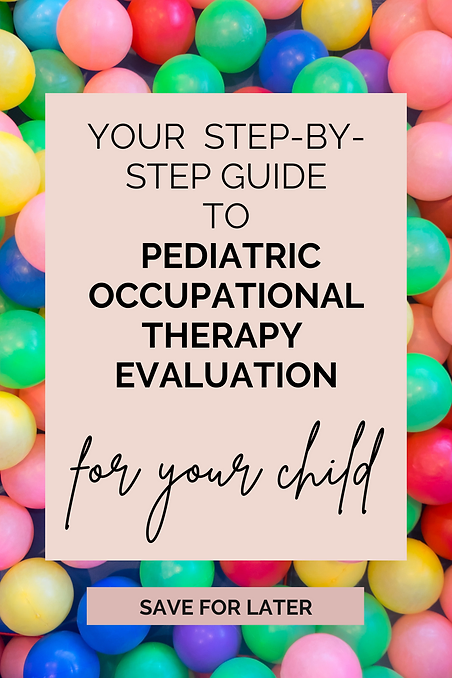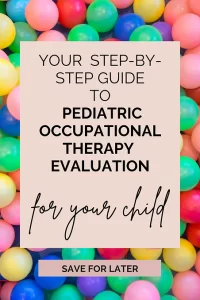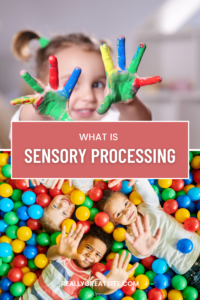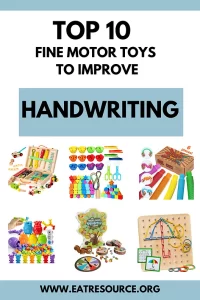
Your Step-By-Step Guide to Pediatric Occupational Therapy Evaluation For Your Child
A comprehensive guide for parents on what to expect during a pediatric occupational therapy evaluation.
From the initial consultation to understanding the results, this informative guide provides insights and valuable information for your child’s journey.

Hi! My name is Marra, and I’m a momma of a sweet 2-year-old. I’m also a licensed pediatric therapist who has spent years working with children of all ages with developmental needs.
I’ve done countless initial evaluations with children and their families; this is one of my favorite parts of my job. I got the pleasure of getting to know some pretty incredible kids from a holistic perspective and advocating for OT!
As a parent, you want the best for your child. You want them to thrive in all areas of development and have the opportunity to reach their full potential.
Maybe your child has some developmental challenges, or maybe they have been recommended for a pediatric evaluation by their pediatrician, teacher, or maybe a close family friend.
If you’re feeling worried and overwhelmed because you don’t even know what the hell OT is, please know you are not alone. Only 10 % of the parents
I worked with knew what OT was when I met them. In this article, we will explore what pediatric occupational therapy is, what to expect during an evaluation, the benefits of therapy, understanding evaluation results, and continuing therapy after an evaluation if you choose to.
So, if you’re ready to take the first step in helping your child reach their full potential, keep reading.
WHAT IS PEDIATRIC OCCUPATIONAL THERAPY?
Pediatric occupational therapy (OT) is a therapy service for children. OTs focus on helping people improve participation in activities that are meaningful to them.
Basically, OTs are here to make life a little easier. Some of the activities children work on in OT are play, school-based activities, sensory processing, fine motor skills (activities we do with our hands, such as writing), and daily living activities.
OTs take a holistic and client-centered approach to therapy, which means they take into account all aspects of the child, family, and environment in order to help them accomplish goals that are meaningful to them and their family.

WHAT PEDIATRIC OCCUPATIONAL THERAPY IS NOT!
Knowing what NOT to expect when bringing your child to an OT evaluation is important. OTs can NOT diagnose children. This means that the results of the evaluation will be one of 2 things.
Yes, OT is recommended, or no, OT is not recommended at this time. OTs cannot prescribe medication, and their job is NOT to “fix” or “change” your child in any way.
Most pediatric OTs take a play-based therapy approach and use your child’s strengths to help them reach the next developmental step.
Honestly, OT is really fun! The children are challenged during therapy, however, OTs are really good at making therapy fun.

MOST IMPORTANT THING TO REMEMBER.
As an OT, I always want to empower the parents I work with. It is critical that through this whole process, you remember that no one knows your child better than you.
You are your child’s biggest advocate, and at the end of the day, you have to trust yourself with these big decisions because only you, as the parent, know what’s best for your child and your family.
It’s important to remember that it is your decision on whether or not to get a pediatric occupational therapy evaluation. Once the evaluation is completed, the therapist will either recommend or not recommend OT services.
Then you decide whether or not to start OT services. And once you start, you can pause or stop therapy at any time. You hold the power as the parent, and anything you hear from anyone else is simply a recommendation.
I hope this ease some of the stress and fear. Just know you do not have to make all the decisions today. OK, let’s dive into what to expect during an occupational therapy evaluation.
WHAT TO EXPECT DURING A PEDIATRIC OCCUPATIONAL THERAPY EVALUATION
As I mentioned before, OTs take a holistic approach to therapy, so they will ask a lot of questions during the OT evaluation. Mostly for you as the parent, depending on how old your child is and their level of communication.
Typically it’ll start with what brought you to the evaluation and what are your child’s challenges and strengths. Below is a list of areas the OT will ask you about.
- What goals would you and your child like to work on in OT?
- Your child’s strengths
- Your child’s interest
- Medical history
- Developmental history
- Home life, who does your child live with, siblings, grandparents, pets
- Past therapy services
- School information
- Any behavioral or social concerns
Based on your initial reason for seeking out a pediatric occupational therapy evaluation, the OT may choose a few assessments in some or all of these areas
- Sensory Processing – How your child processes and understands their environment
- Gross motor skills – strength, balance, coordination
- Fine motor skills – stacking blocks, coloring, handwriting, scissors skills
- Visual motor perception – hand-eye coordination
- Self-help skills – feeding, dressing, bathing,
- Informal observation
I know It’s a lot! But the more information the OT has about your child, the more informed the recommendation and the more supportive the therapy will be. All assessments are forms to fill out or play-based activities, so there is nothing to be afraid of.

AFTER THE PEDIATRIC OCCUPATIONAL THERAPY EVALUATION
Following the evaluation, the therapist will answer any questions you may have. In most settings, the therapist will want to score the assessments and look over everything before making recommendations.
Typically this is within a couple of weeks, and the therapist should discuss the results with you and provide a written evaluation. The therapist may also provide resources and strategies to help the child succeed in their daily life.
Remember that the evaluation, the information you give the therapist, and the results are completely confidential and protected by HIPPA.
So it’s against the law to share information. You have to give consent for the OT to talk with anyone outside your family, including your child’s teacher.
Understanding what to expect during a pediatric occupational therapy evaluation can help parents and children feel more comfortable and prepared for the assessment process.
It is an important step in identifying any challenges the child may be facing and developing a plan to help them achieve their full potential. In the next section, we will explore the benefits of pediatric occupational therapy and how it can help children thrive.,
BENEFITS OF PEDIATRIC OCCUPATIONAL THERAPY
Pediatric occupational therapy provides a range of benefits to children who are struggling with everyday activities such as dressing, eating, or learning.
By using play-based therapy techniques, occupational therapists can help children develop better motor, sensory, and cognitive skills, improving their overall quality of life.
One of the main benefits of pediatric occupational therapy is that it is highly individualized. Occupational therapists tailor their treatment plans to each child’s unique needs, ensuring they receive the specific interventions required to help them succeed.
Furthermore, because occupational therapy is a fun and engaging activity, children are more likely to be motivated to participate in therapy and work toward their goals.
Another benefit of pediatric occupational therapy is that it can improve a child’s ability to participate in school and social settings.
By strengthening skills such as attention, organization, and problem-solving, occupational therapy can help children succeed academically and socially.
Additionally, children who receive occupational therapy may experience improved self-esteem and confidence as they develop new skills and accomplishments.
Overall, pediatric occupational therapy can be a valuable tool for helping children overcome challenges and reach their full potential.
By providing children with individualized support and fun, engaging therapy activities, occupational therapists can help them develop the skills they need to thrive.

CONTINUING THERAPY AFTER A PEDIATRIC OCCUPATIONAL THERAPY EVALUATION
After completing a pediatric occupational therapy evaluation, parents may wonder what their next steps should be. It’s important to remember that the evaluation is the first step in the treatment process.
If the therapist recommends OT for your child, it is your decision whether or not to follow through. That being said. I’ve been able to witness drastic changes and huge goals accomplished in treatment sessions while kids are having fun!
Your child’s therapist will develop a customized treatment plan based on the results of the evaluation.
The plan will focus on addressing the specific areas of need identified during the evaluation and building on the child’s strengths. The therapist will work with the child and their parents to set achievable goals and establish a timeline for therapy sessions.
It’s important for parents to remain engaged in the therapy process after the evaluation. This includes attending all scheduled therapy sessions and actively participating in the treatment plan.
Parents should also communicate any concerns or questions they have with the therapist on an ongoing basis.
By continuing therapy after an evaluation, parents can support their child’s progress toward achieving their goals.
With the guidance of the therapist and an understanding of the evaluation results, parents can play an active role in their child’s therapy and help their child reach their full potential.,
Pediatric occupational therapy evaluations may seem overwhelming initially, but an OT eval can only benefit your child and your family.
By understanding what to expect during an evaluation, the benefits of therapy, and how to continue therapy after an evaluation, you can set your child up for success.
Always reach out to a qualified occupational therapist if you have any concerns about your child’s development. Your child can thrive and reach their full potential with the right guidance and support.
Please reach out with questions or comments..
